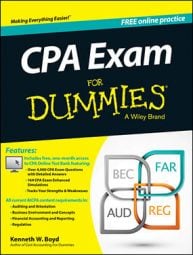The regulation (REG) test on the CPA exam focuses on two areas of business: business law and taxation. Consider using flashcards to learn and memorize terms for the REG section. You need to digest many definitions, facts, and figures before you take this test, and flashcards can be a big help.
Which of the following statements concerning agency law is not true?
A. The agent owes a fiduciary duty to the principal.
B. The agent’s duties are by necessity based on contract law.
C. The principal does not owe his/her agent fiduciary duties.
D. The agent does not owe fiduciary duties to third parties with which the principal asks the agent to deal.
Answer: B. Although there’s typically a contract between the principal and agent in an agency relationship, this isn’t required. For example, a principal may authorize a friend to act as his or her agent, and the agent might consent to do it as a favor. Additionally, the agent owes the principal fiduciary duties regardless of what duties are imposed by an employment contract.
Dark Corp. is a general creditor of Blue. Blue filed a petition in bankruptcy under the liquidation provisions of the Bankruptcy Code.
Dark wishes to have the bankruptcy court either deny Blue a general discharge or not have its debt discharged. The discharge will be granted, and it will include Dark’s debt even if
A. Dark’s debt is unscheduled.
B. Dark was a secured creditor which was not fully satisfied from the proceeds obtained upon disposition of the collateral.
C. Blue has unjustifiably failed to preserve the records from which Blue’s financial condition might be ascertained.
D. Blue had filed for and received a previous discharge in bankruptcy under the liquidation provisions within 8 years of the filing of the present petition.
Answer: B. The fact that the debt of a secured party wasn’t fully satisfied from the proceeds obtained from disposition of the collateral won’t result in a denial of a general discharge, nor will the remaining portion of the secured debt be nondischargeable. In such situations, the secured party has the same priority as a general unsecured creditor (lowest priority) concerning the unpaid portion of the debt.
Which of the following decreases stockholders’ equity?
A. Investments by owners.
B. Distribution to owners.
C. Issuance of stock.
D. Acquisition of assets in a cash transaction.
Answer: B. The requirement is to identify the item that decreases stockholders’ equity. This answer is correct because distribution to owners (dividends) decreases stockholders’ equity.
Generally, which one of the following transfers will be valid without the consent of the other parties?
A. The assignment by the lessee of a lease contract where rent is a percentage of sales.
B. The assignment by a purchaser of goods of the right to buy on credit without giving security.
C. The assignment by an architect of a contract to design a building.
D. The assignment by a patent holder of the right to receive royalties.
Answer: D. In general, a party’s rights in a contract are assignable without the consent of the other parties. However, the following are situations in which this general rule doesn’t apply and consent of the other parties would be required for a valid transfer to occur:
(1) The contract involves personal services, credit, trust, or confidence; (2) a provision of the contract or statute prohibits assignment; and (3) the assignment would materially change the risk or obligations of the other party. Because the assignment by a patent holder of the right to receive royalties wouldn’t alter the rights of the other parties to the contract, a valid transfer could be made without the consent of these parties.
Calhoun has in his possession a negotiable instrument which was originally payable to the order of Bannister.
It was transferred to Calhoun by a mere delivery by Travis, who took it from Bannister in good faith in satisfaction of an antecedent debt. The back of the instrument reads as follows: “Pay to the order of Travis in satisfaction of my prior purchase of a used IBM typewriter, signed Bannister.” Which of the following is correct?
A. Travis’s taking the instrument for an antecedent debt prevents him from qualifying as a holder in due course.
B. Calhoun is a holder in due course.
C. Calhoun has the right to assert Travis’s rights, including his standing as a holder in due course, and also has the right to obtain Travis’s signature.
D. Bannister’s endorsement was a special endorsement; thus, Travis’s signature was not required in order to negotiate it.
Answer: C. Transfer of an instrument causes the rights that the transferor had to vest with the transferee. Because Travis is an HDC (holder in due course), Calhoun acquires the rights of an HDC. Unless otherwise agreed, any transfer for value of an instrument not then payable to bearer (that is, “order paper”) gives the transferee the specifically enforceable right to have the unqualified endorsement of the transferor.
Which of the following is true under the Family and Medical Leave Act?
A. The employee has the right to up to 12 workweeks of unpaid leave to care for his or her spouse who has a serious health problem.
B. The employee has the right to up to 12 workweeks of paid leave to care for his or her newborn baby.
C. The employee has the right to up to 12 workweeks of paid leave for the employee’s own serious medical problems.
D. This Act covers employees of all corporations and partnerships.
Answer: A. The employee has the right to up to 12 workweeks of unpaid leave to care for his or her spouse who has a serious health problem.

